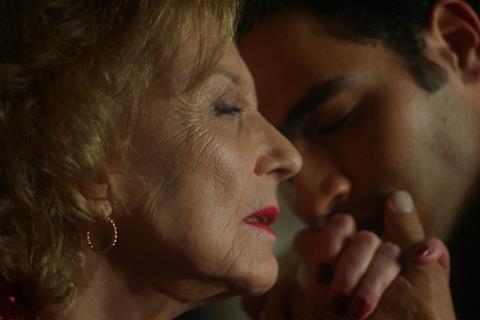The late Paredes is one of several passengers embarking on a magical mystery tour for director Lluis Minarro

Dir: Lluis Minarro. Spain. 2025. 96 mins
The cinema of Catalan director Lluis Minarro always guarantees a welcome break from prevailing film trends, and his quietly compelling, dreamlike third feature Emergency Exit, a homage to the forging of Minarro’s own filmic imagination, is no exception. Recounting the multiple exchanges on a magical mystery tour aboard a bus peopled with 14 characters who exist somewhere between reality and symbol, the film is light of touch, graceful and often very funny as it glancingly tackles some of life’s grandest themes.
Light of touch, graceful and often very funny
A veteran Cannes-award-winning producer, Minarro has been a regular auteur presence at Euro festivals since 2014’s Falling Star, and Emergency Exit, which now plays Tallin after premiering at San Sebastian, looking set to follow suit. Sadly, the film also represents the swansong of the great Spanish actress Marisa Paredes, who died in late 2024, and it should attract a strong domestic audience when it opens in Spain in December.
Paredes plays an actress here, the first character to board the bus after emerging majestically from a 1958 Ford Edsel in a dress of red sequins. She will spend much of the journey bickering with her manager/husband (played by Francesc Orella) and uttering withering one-liners such as “marriage is a chain dragged by two people”.
Twelve other characters are along for the ride: the only named ones are gossipy, bourgeois Asunción and Brigitte (Myriam Mezieres and Arielle Dombasle, who both came to prominence via their work with Alain Tanner and Eric Rohmer). Among the others are a jaded film-maker (Albert Pla), who is beavering away at a script and who delivers the winning line that “cinema is not a good business, but it’s the most elegant way of not making money”.
Joining them are a Japanese anthropologist (director Naomi Kawase), who is collecting lullabies from round the world; a sexually repressed priest (Oriol Pla); an embittered housewife (Aida Folch) and her super-bright daughter (Laia Brugarolas); a merchant (Gonzalo Cunill) who sells only rusty nails; a gynaecologist (Emma Suarez); and a muscled Eros figure, Venus in Fur (Jhonattan Burjack), who flits in and out of the characters’ dreams wearing only a fur coat and white Y-fronts, engaging in sexually-charged encounters with quite a few of the passengers.
As back-projected images of the Canary Islands’s alien landscapes fly past the windows, the characters chat – sometimes wittily, sometimes profoundly – as surreal interludes pop up. It all adds up to Minarro’s highly personal, challenging and subversive screen-dream about modern life; its materialism, its moral emptiness, its lack of spirituality, its artificiality and its general sense that we’re all on a bus that we can’t control, hurtling towards a destination we can’t name. (Somewhat chillingly, the bus driver is tattooed with a human skeleton). And, of course, it’s all wrapped up in a welter of film and culture references.
The retro air of Emergency Exit signals it as an attempt by Minarro to update the urgently subversive social cinema of the 60s and 70s: the shadow of The Exterminating Angel (1962), from which Emergency Exit borrows its impossibility-of-escape motif, clearly overhangs it.
But, as with Bunuel’s masterpiece, this is not in the least forbidding – the pace is fast, there’s always a playful, ironic twist somewhere nearby, it’s saved from pretentiousness and self-indulgence by tight authorial and technical control. Sometimes it’s downright crudely hilarious, as when the priest awakes from an erotic dream about Venus in Fur only to find Venus himself offering him a peeled banana to bite on. (Some of the film’s satirical targets can in fact feel a bit retro – that priests can be hypocrites, or that men can be brutes, no longer comes as much of a surprise.)
Moments of peace and gentleness can be found, too – one sequence of the travellers asleep, accompanied by a simple piano melody by Anahit Simonian, is moving in its peacefulness. Another especially touching sequence, particularly given that this is Marisa Paredes’ final film, has the actress nostalgically looking through old photographs and recollecting her encounters with the great and the good of the 60s and 70s counterculture. There sits the younger Paredes, frozen in time with Chabrol, Bertolucci, Deneuve, García Marquez, Lou Reed, and with others from Spain (Almodovar) and Catalonia. She could scarcely have a more fitting cinematic tribute.
Production company: Eddie Saeta, Lluis Minarro. El Viaje
International sales: Axxon Films films@axxon-media.com
Producers: Lluis Minarro, Jose Alayon
Screenplay: Lluis Minarro, Angels Oliva
Cinematography: Jimmy Gimferrer
Production design: Lu Mascaro, Sebastian Vogler
Editing: Diana Toucedo
Music: Anahit Simonian
Main cast: Marisa Paredes, Francesc Orella, Emma Suarez, Albert Pla, Arielle Dombasle, Myriam Mezieres, Naomi Kawase, Gonzalo Cunill, Oriol Pla, Jhonattan Burjack, Aida Folch, Lu Colomina, Miquel Barbera

























No comments yet